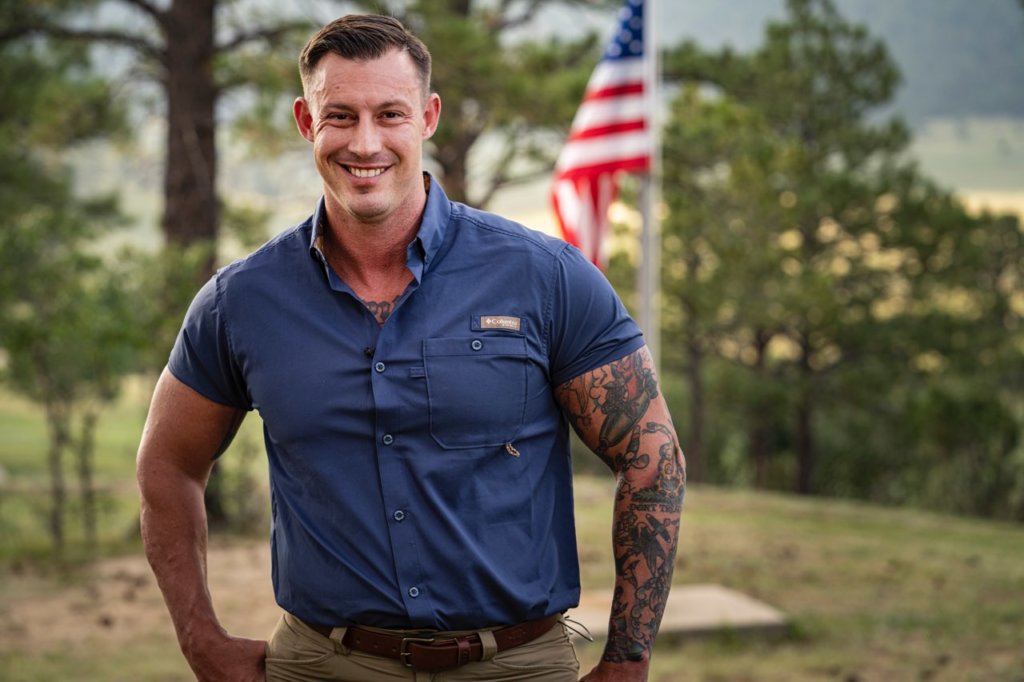THE ROOM FROZE WHEN HE WALKED IN — AND EVERY CAMERA TURNED

It wasn’t on the rundown. No cue card, no segment slot, no pre-approved script. The Charlie Kirk Show was halfway through a fiery live debate about media ethics when something happened that no one in the control room could have predicted. The studio door opened — and Johnny Joey Jones walked in.
He wasn’t scheduled. He wasn’t even supposed to be in the building. But the moment he appeared, everything stopped. The air changed. The hum of the lights, the clicking keyboards in the production bay, the whispered countdowns in earpieces — all froze.
An Entrance Without Permission
Jones didn’t wait for an introduction. He didn’t nod to the cameras or look for a chair. The retired Marine, known for his sharp wit and no-nonsense candor, simply walked to the center of the stage, eyes fixed on the lens. His boots echoed against the studio floor, each step louder than the last.
Then he said ten words.
Ten words that would split the internet, silence the pundits, and make broadcast executives question everything they thought they controlled.
Nobody has confirmed exactly what those ten words were — not the producers, not Kirk, not Megyn Kelly, who was co-anchoring that day with her trademark calm precision. But every witness agrees on one thing: it was raw, unscripted truth. Something that cut through the noise of politics, ratings, and carefully managed narratives.

Shockwaves in the Control Room
Inside ABC’s control booth, technicians froze mid-gesture. One had their finger over the “cut to commercial” button but didn’t move. Another stared at the audio meters as if hypnotized. Upstairs, behind a wall of glass, an executive stood perfectly still — no blinking, no breathing, just disbelief.
On set, Erika Kirk — Charlie’s wife and co-producer — didn’t flinch. She simply folded her hands, looked at Jones, and nodded. It was as if she’d been expecting this moment all along.
The silence that followed his statement stretched for nearly thirty seconds. That may sound brief, but on live television it’s an eternity — a lifetime of dead air that no broadcaster ever allows. Yet no one cut him off. No one dared.
Then, slowly, Megyn Kelly spoke.
“Johnny,” she said softly, “if that’s how you feel… say it again.”
And he did.

The Internet Erupts
By the time the segment ended, clips were already racing across social media. Within minutes, hashtags appeared: #JonesMoment, #TelevisionAwakens, #TruthLive. The original broadcast was replayed, re-cut, and analyzed frame by frame by millions of viewers who couldn’t believe what they’d just witnessed.
“Television finally woke up,” one comment read. “That’s what courage looks like,” said another.
Within an hour, the clip hit ten million views on X (formerly Twitter). By the end of the day, it had crossed 50 million across all platforms. News sites scrambled to get transcripts. Others speculated whether Jones had violated network policy or breached security. But inside ABC, the celebration that had filled the building earlier that week — over record ratings for The Charlie Kirk Show’s new primetime slot — turned to complete silence.
Executives weren’t sure whether to panic or applaud.
A New Kind of Power
For years, The Charlie Kirk Show had been shaking the foundations of broadcast news. With Erika’s calm command behind the scenes, Megyn Kelly’s razor-sharp delivery on camera, and Charlie’s relentless energy, it had built a reputation for breaking stories before the mainstream caught up — and for asking questions other networks avoided.
But what happened that afternoon was something else entirely. It wasn’t journalism. It wasn’t activism. It was a reminder that authenticity — even when uncomfortable — still has the power to break through walls of corporate caution.
When Jones walked into that studio, he didn’t just hijack a broadcast. He exposed the difference between speaking truth and producing television.
Afterward, when reporters caught up with him outside the building, Jones refused to give a full statement. All he said was: “Sometimes you don’t wait to be invited. You just show up.”
Those words — simple, defiant, and unmistakably Marine — have since been repeated across podcasts, college campuses, and living rooms. They’ve become a kind of creed for a growing audience tired of what they call “manufactured authenticity.”
Behind the Glass
Inside the network, reactions were divided. One senior executive allegedly shouted that Jones had “destroyed months of programming strategy.” Another called it “the boldest live moment since Cronkite.” Younger producers, most in their twenties, reportedly applauded.
Erika Kirk, according to several crew members, stayed calm. She met with Jones privately after the show, away from cameras. No transcript has surfaced, but witnesses say she smiled as he left, as if she understood something the rest didn’t.
Charlie Kirk, meanwhile, leaned into the moment. On his next broadcast, he opened with a single line: “Sometimes history doesn’t knock. It kicks the door open.”
Megyn Kelly — ever the tactician — used her podcast that night to dissect the reaction, saying, “People think control is safety. But control is also silence. Today, silence lost.”
The Movement Begins
By mid-week, petitions and online campaigns began urging ABC to give Jones his own recurring segment. Others demanded he be banned from the network entirely. Sponsors called, unsure whether to pull ads or double their investment. The network board scheduled an emergency meeting.
Through it all, Jones stayed quiet — except for one post on his social media feed: a black-and-white photo of the studio door with the caption: “Some rooms need freezing before they wake up.”
It went viral instantly.
Commentators compared the trio — Jones, Kirk, and Kelly — to past media disruptors like Edward R. Murrow or Howard Beale. But this time, it wasn’t about outrage for ratings. It was about unfiltered humanity in a landscape of rehearsed emotion.
A Line Crossed — or a Line Redrawn?
Media analysts are still debating what actually happened that day. Was it a stunt? A spontaneous act of rebellion? Or the birth of a new form of journalism that values conviction over compliance?
Whatever it was, it left a mark. Even rival networks admitted that something fundamental had shifted. One CNN anchor reportedly said off-air, “We’ll all be chasing that moment now.”
ABC hasn’t issued a formal statement, and perhaps they never will. Because how do you explain a moment that wasn’t planned, rehearsed, or approved — but still became the most talked-about broadcast of the year?
After the Silence
Weeks later, the ripple effect continues. The Charlie Kirk Show’s ratings have soared. More importantly, its tone has changed. Each episode feels less like television and more like a conversation between people who refuse to read from a script.
And Johnny Joey Jones? He’s back to doing what he’s always done — speaking his mind, helping veterans, and showing up when least expected.
Because that’s what the moment was really about: showing up. Not when invited. Not when it’s safe. But when it matters.
As one viewer wrote under a viral clip that night:
“He didn’t come to make television.
He came to remind it why it exists.”
And somewhere, in a control room still echoing with that stunned silence, they all know he succeeded.
Then he said ten words.
Ten words that would split the internet, silence the pundits, and make broadcast executives question everything they thought they controlled.
Nobody has confirmed exactly what those ten words were — not the producers, not Kirk, not Megyn Kelly, who was co-anchoring that day with her trademark calm precision. But every witness agrees on one thing: it was raw, unscripted truth. Something that cut through the noise of politics, ratings, and carefully managed narratives.

Shockwaves in the Control Room
Inside ABC’s control booth, technicians froze mid-gesture. One had their finger over the “cut to commercial” button but didn’t move. Another stared at the audio meters as if hypnotized. Upstairs, behind a wall of glass, an executive stood perfectly still — no blinking, no breathing, just disbelief.
On set, Erika Kirk — Charlie’s wife and co-producer — didn’t flinch. She simply folded her hands, looked at Jones, and nodded. It was as if she’d been expecting this moment all along.
The silence that followed his statement stretched for nearly thirty seconds. That may sound brief, but on live television it’s an eternity — a lifetime of dead air that no broadcaster ever allows. Yet no one cut him off. No one dared.
Then, slowly, Megyn Kelly spoke.
“Johnny,” she said softly, “if that’s how you feel… say it again.”
And he did.

The Internet Erupts
By the time the segment ended, clips were already racing across social media. Within minutes, hashtags appeared: #JonesMoment, #TelevisionAwakens, #TruthLive. The original broadcast was replayed, re-cut, and analyzed frame by frame by millions of viewers who couldn’t believe what they’d just witnessed.
“Television finally woke up,” one comment read. “That’s what courage looks like,” said another.
Within an hour, the clip hit ten million views on X (formerly Twitter). By the end of the day, it had crossed 50 million across all platforms. News sites scrambled to get transcripts. Others speculated whether Jones had violated network policy or breached security. But inside ABC, the celebration that had filled the building earlier that week — over record ratings for The Charlie Kirk Show’s new primetime slot — turned to complete silence.
Executives weren’t sure whether to panic or applaud.
A New Kind of Power
For years, The Charlie Kirk Show had been shaking the foundations of broadcast news. With Erika’s calm command behind the scenes, Megyn Kelly’s razor-sharp delivery on camera, and Charlie’s relentless energy, it had built a reputation for breaking stories before the mainstream caught up — and for asking questions other networks avoided.
But what happened that afternoon was something else entirely. It wasn’t journalism. It wasn’t activism. It was a reminder that authenticity — even when uncomfortable — still has the power to break through walls of corporate caution.
When Jones walked into that studio, he didn’t just hijack a broadcast. He exposed the difference between speaking truth and producing television.
Afterward, when reporters caught up with him outside the building, Jones refused to give a full statement. All he said was: “Sometimes you don’t wait to be invited. You just show up.”
Those words — simple, defiant, and unmistakably Marine — have since been repeated across podcasts, college campuses, and living rooms. They’ve become a kind of creed for a growing audience tired of what they call “manufactured authenticity.”
Behind the Glass
Inside the network, reactions were divided. One senior executive allegedly shouted that Jones had “destroyed months of programming strategy.” Another called it “the boldest live moment since Cronkite.” Younger producers, most in their twenties, reportedly applauded.
Erika Kirk, according to several crew members, stayed calm. She met with Jones privately after the show, away from cameras. No transcript has surfaced, but witnesses say she smiled as he left, as if she understood something the rest didn’t.
Charlie Kirk, meanwhile, leaned into the moment. On his next broadcast, he opened with a single line: “Sometimes history doesn’t knock. It kicks the door open.”
Megyn Kelly — ever the tactician — used her podcast that night to dissect the reaction, saying, “People think control is safety. But control is also silence. Today, silence lost.”
The Movement Begins
By mid-week, petitions and online campaigns began urging ABC to give Jones his own recurring segment. Others demanded he be banned from the network entirely. Sponsors called, unsure whether to pull ads or double their investment. The network board scheduled an emergency meeting.
Through it all, Jones stayed quiet — except for one post on his social media feed: a black-and-white photo of the studio door with the caption: “Some rooms need freezing before they wake up.”
It went viral instantly.
Commentators compared the trio — Jones, Kirk, and Kelly — to past media disruptors like Edward R. Murrow or Howard Beale. But this time, it wasn’t about outrage for ratings. It was about unfiltered humanity in a landscape of rehearsed emotion.
A Line Crossed — or a Line Redrawn?
Media analysts are still debating what actually happened that day. Was it a stunt? A spontaneous act of rebellion? Or the birth of a new form of journalism that values conviction over compliance?
Whatever it was, it left a mark. Even rival networks admitted that something fundamental had shifted. One CNN anchor reportedly said off-air, “We’ll all be chasing that moment now.”
ABC hasn’t issued a formal statement, and perhaps they never will. Because how do you explain a moment that wasn’t planned, rehearsed, or approved — but still became the most talked-about broadcast of the year?
After the Silence
Weeks later, the ripple effect continues. The Charlie Kirk Show’s ratings have soared. More importantly, its tone has changed. Each episode feels less like television and more like a conversation between people who refuse to read from a script.
And Johnny Joey Jones? He’s back to doing what he’s always done — speaking his mind, helping veterans, and showing up when least expected.
Because that’s what the moment was really about: showing up. Not when invited. Not when it’s safe. But when it matters.
As one viewer wrote under a viral clip that night:
“He didn’t come to make television.
He came to remind it why it exists.”
And somewhere, in a control room still echoing with that stunned silence, they all know he succeeded.






















